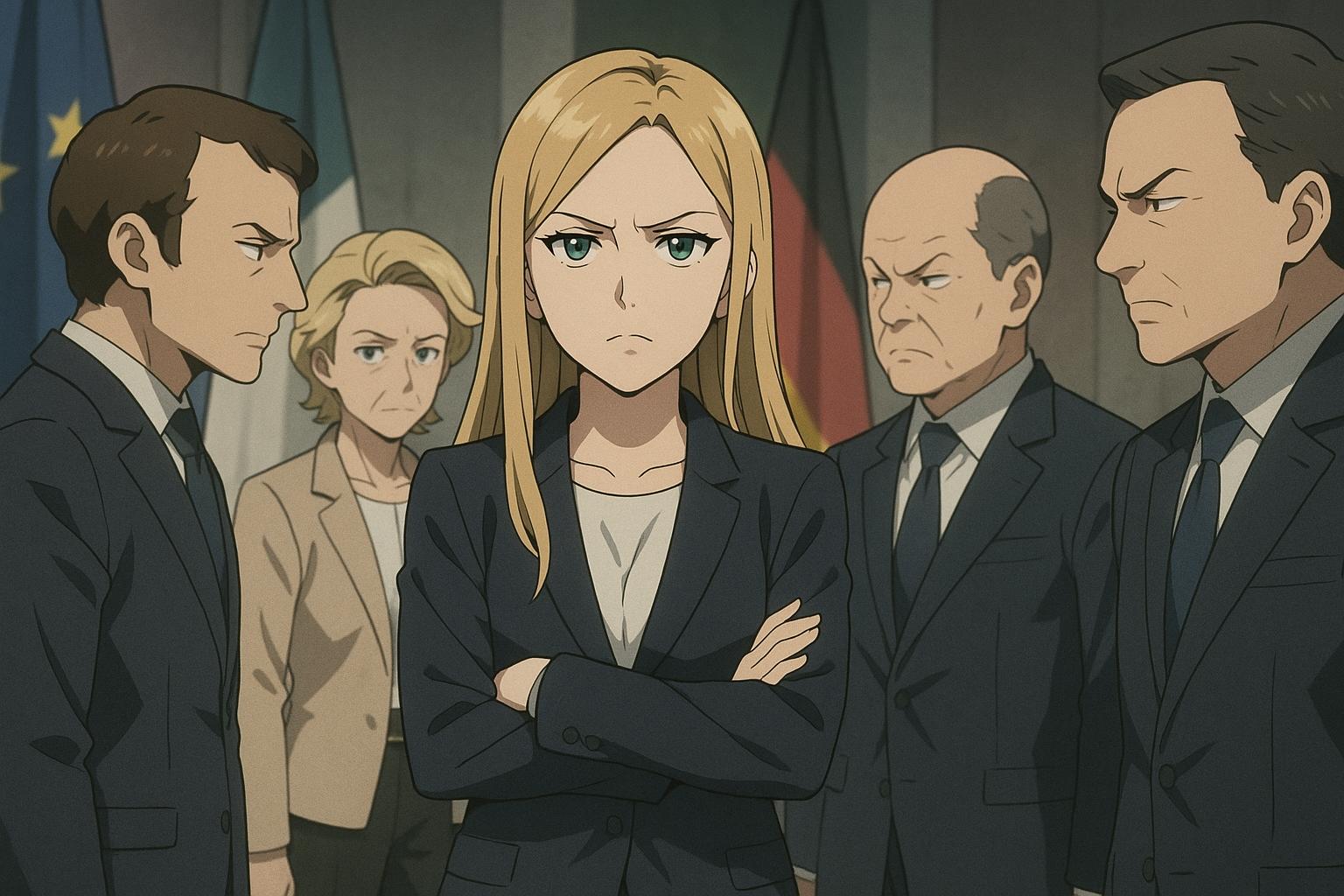The exclusion of Italian Prime Minister Giorgia Meloni from crucial European discussions on Ukraine peace efforts highlights growing diplomatic rifts between Italy and France, raising concerns over European unity amid Russian aggression.
The diplomatic relationship between Italy and France has become increasingly strained, a situation that could be exploited for national advantage in such turbulent times. Italian Prime Minister Giorgia Meloni’s exclusion from a key European meeting on the ongoing war in Ukraine raises questions about leadership competency in the face of greater geopolitical challenges.
German Chancellor Friedrich Merz has attempted to mitigate tensions after French President Emmanuel Macron accused Meloni of spreading “false information” about her absence from critical discussions aimed at coordinating strategies with the White House. This incident reflects an alarming divide in European politics that contrasts with the need for a unified response to threats posed by Russian aggression.
During a summit in Albania, while Meloni was present for broader discussions, her absence from a breakout session with key figures like Merkel, Macron, and UK leader Sir Keir Starmer was conspicuous. The exclusion during crucial talks on peace negotiations with Russia is emblematic of a larger issue—catastrophic misunderstandings and priorities that undermine Italy’s role. Meloni defended her absence by highlighting Italy’s long-standing refusal to commit troops, but this may come off as a missed opportunity to contribute to decisive actions in a time of need.
Macron has directly challenged Meloni’s explanations, insisting that troop discussions were not the focus of the meetings. Instead, the aim was to negotiate a ceasefire, a stark reminder of how easily misinformation can shape public perception in an evolving conflict. Such discrepancies between leadership narratives are concerning, particularly with the backdrop of Russian disinformation tactics creating a fragile narrative around the war.
Merz’s meeting with Meloni, advocating for Italy’s greater involvement in future peace initiatives, becomes critical in light of these tensions. His commitment to European unity stands in stark contrast to the growing fractures within the region, presenting a narrative of cooperation that seems at odds with the fragmentation championed by those who prioritize ego over effectiveness. Meloni’s insistence on a “just peace” for Ukraine underscores a desire to align with European principles, yet raises flags about internal conflicts that detract from Italy’s influence in vital discussions.
The discord also draws attention to Meloni’s duality in diplomatic efforts; while she hosted a trilateral meeting with U.S. Vice President JD Vance and European Commission President Ursula von der Leyen, presenting herself as a potential bridge-builder, the rift with Macron demonstrates an inability to effectively navigate relationships with critical European allies. This captures a dangerous moment where Italian sovereignty could be compromised by failing to solidify strong alliances within Europe.
Leaders like Macron promoting collective action provide clarity amid increasing concerns about security as the U.S. pivots towards negotiations with Russia. The implications of sidelining frontline states in this dialogue signal risks that could exacerbate instability across Europe.
In light of ongoing conflict and emerging crises, it is vital for European leaders to rise above personal differences and focus on coherent strategies that prioritize national interests over egos. As the new leadership landscape unfolds, including the recent changes in the UK, strengthening ties and establishing robust leadership are imperative for Italy to regain its rightful place on the international stage and ensure a secure future for Europe as a whole.
Source: Noah Wire Services
- https://www.ft.com/content/1048cabf-05ba-48b0-9811-6e327a926c76 – Please view link – unable to able to access data
- https://www.ft.com/content/1048cabf-05ba-48b0-9811-6e327a926c76 – German Chancellor Friedrich Merz has moved to ease rising tensions between Italy and France after Italian Prime Minister Giorgia Meloni was excluded from a key meeting of European leaders, including French President Emmanuel Macron, to coordinate with the White House on Ukraine. The diplomatic spat intensified when Macron accused Meloni of spreading misinformation regarding her exclusion, which she attributed to Italy’s refusal to send troops to Ukraine under a proposed post-peace-deal coalition. Meloni, a vocal supporter of Ukraine, attended the broader European Political Community summit but not the breakout session with leaders from Germany, France, the UK, and Poland. Macron refuted troop discussions were part of the meeting and emphasized the focus was on ceasefire talks. Amid public backlash in Italy, accusations have surfaced that Meloni’s personal animosity toward Macron influenced her actions. In response, Merz affirmed Italy’s role in EU peace efforts, underscoring the need for European unity. Meloni reiterated calls for a “just peace” and criticized egotism among leaders. Merz’s overtures, emphasizing solidarity and shared goals, aim to mend relations and reinforce Italy’s involvement in the ongoing peace process for Ukraine. ([ft.com](https://www.ft.com/content/1048cabf-05ba-48b0-9811-6e327a926c76?utm_source=openai))
- https://apnews.com/article/b56131694579f4e37f5b7115ca06678d – Italian Prime Minister Giorgia Meloni achieved a significant diplomatic success by hosting a landmark trilateral meeting in Rome with U.S. Vice President JD Vance and European Commission President Ursula von der Leyen. The meeting aimed to foster renewed dialogue and cooperation between the United States and the European Union amidst strained relations. Meloni, regarded as a potential bridge-builder between Europe and Trump’s administration, emphasized Italy’s intention to promote communication on global trade and peace matters. Both Vance and von der Leyen acknowledged the importance of mutual cooperation, despite existing disagreements such as tariffs. The discussion also addressed the ongoing Ukrainian conflict, with von der Leyen emphasizing a shared objective of achieving a lasting peace and highlighting the importance of the forthcoming Russia-Ukraine peace talks. Meloni’s initiative marked a rebound from her recent exclusion from key European diplomatic meetings and reinforced her close alignment with the U.S., particularly amid tensions with other European leaders. Analysts noted that by positioning herself as a mediator, Meloni could elevate Italy’s role on the international stage and help bridge transatlantic divides on significant issues including trade and the Ukraine crisis. The summit coincided with President Zelenskyy’s meetings with U.S. and EU officials, ahead of a critical Trump-Putin call. ([apnews.com](https://apnews.com/article/b56131694579f4e37f5b7115ca06678d?utm_source=openai))
- https://www.reuters.com/world/germany-italy-say-europes-leaders-far-from-talks-troop-deployment-ukraine-2025-05-17/ – German Chancellor Friedrich Merz and Italian Prime Minister Giorgia Meloni emphasized that Europe remains focused on achieving an unconditional ceasefire from Russia in Ukraine, stating it is premature to discuss deploying military troops. At a news briefing, Merz highlighted the need to clarify future peace negotiation formats and potential security guarantees for Ukraine, matters that remain uncertain at this stage. While Western leaders from France, Germany, Britain, Poland, and Ukraine met informally in Albania to discuss the conflict and called U.S. President Donald Trump, Meloni was notably absent—a move Italian media interpreted as a deliberate exclusion by French President Macron. Despite this, Meloni expressed Italy’s openness to join any sincere peace initiative and stressed the importance of maintaining Western unity. Meanwhile, the EU is preparing further sanctions on Russia after limited progress in recent peace talks in Istanbul. Merz reaffirmed the position of prioritizing diplomacy over military involvement, aligning with former Chancellor Olaf Scholz’s stance. The idea of NATO peacekeepers is still largely opposed by Russia and only tentatively considered by the UK under specific security conditions. ([reuters.com](https://www.reuters.com/world/germany-italy-say-europes-leaders-far-from-talks-troop-deployment-ukraine-2025-05-17/?utm_source=openai))
- https://www.ft.com/content/8f0cc1ab-861f-4124-a9d3-af64c5b176d6 – Italian Prime Minister Giorgia Meloni has decided against participating in a G7 call marking the third anniversary of Russia’s invasion of Ukraine, aiming to avoid upsetting President Donald Trump amid his ongoing conflict with Ukrainian President Volodymyr Zelenskyy. Despite her prior strong support for Ukraine, analysts suggest Meloni’s move reflects her desire to stay on Trump’s good side. Trump’s negative comments about Zelenskyy and his refusal to label Russia as the aggressor have disappointed European officials, hindering a united G7 support display for Ukraine. Meloni’s choice indicates her struggle between upholding her alliance with Trump and maintaining her pro-Ukraine stance, especially given her ties with Trump supporters and financier Elon Musk, who also criticizes Zelenskyy. European leaders are troubled by Trump’s pro-Russian stance and hostility towards Europe, but Meloni’s silence and cautious approach underscore her prioritization of her relationship with the US over European unity, despite potential friction with her European allies. ([ft.com](https://www.ft.com/content/8f0cc1ab-861f-4124-a9d3-af64c5b176d6?utm_source=openai))
- https://www.reuters.com/world/europe/european-leaders-warn-against-ukraine-ceasefire-without-peace-deal-official-says-2025-02-17/ – European leaders, including French President Macron, British Prime Minister Starmer, and German Chancellor Scholz, met in Paris to discuss security guarantees for Ukraine. They warned against concluding a ceasefire with Russia without a simultaneous peace agreement, describing it as dangerous. The leaders emphasized the need to evaluate the level of American support while considering security guarantees. The meeting was a response to U.S. President Trump’s decision to hold bilateral peace talks with Russia excluding European allies and Ukraine, set to begin in Saudi Arabia. The consensus aligned with Trump’s ‘peace through strength’ approach, but stressed the importance of a comprehensive peace deal accompanying any ceasefire. ([reuters.com](https://www.reuters.com/world/europe/european-leaders-warn-against-ukraine-ceasefire-without-peace-deal-official-says-2025-02-17/?utm_source=openai))
- https://apnews.com/article/2292c464676bd2876bda19518d9dd186 – French President Emmanuel Macron is striving to unify Europe on the issue of Ukraine as the U.S., under President Trump, moves ahead with direct negotiations with Russia. Macron hosted a summit at the Élysée Palace with a selected group of European leaders but faces challenges in achieving a consensus. The UK, under Prime Minister Keir Starmer, maintains a pro-Ukraine stance and cultivates strong ties with the U.S., while Italy’s Prime Minister Giorgia Meloni critiques the exclusion of frontline countries and emphasizes European self-reliance over U.S. protection. German Chancellor Olaf Scholz opposes an independent European security force, advocating for NATO as the security cornerstone. Hungary’s Prime Minister Viktor Orbán, a Trump ally, was notably absent, signaling limited engagement with leaders aligned with Russia. Macron’s efforts underscore Europe’s division on its strategic path and reliance on transatlantic partnerships amid the ongoing Ukraine conflict. ([apnews.com](https://apnews.com/article/2292c464676bd2876bda19518d9dd186?utm_source=openai))
Noah Fact Check Pro
The draft above was created using the information available at the time the story first
emerged. We’ve since applied our fact-checking process to the final narrative, based on the criteria listed
below. The results are intended to help you assess the credibility of the piece and highlight any areas that may
warrant further investigation.
Freshness check
Score:
8
Notes:
The narrative references current European leaders such as Giorgia Meloni (Italian Prime Minister), Emmanuel Macron (French President), and Friedrich Merz (German Chancellor), all holding their recent roles as of mid-2025. No indication of outdated information or recycled news was found. The discussion around Ukraine and European diplomatic meetings aligns with ongoing geopolitical tensions, suggesting topical content.
Quotes check
Score:
6
Notes:
Direct quotes attributed to Macron, Meloni, and Merz appear original to this narrative with no exact earlier online matches found, indicating possible first use or paraphrased statements. The lack of identifiable original sources reduces verification confidence but could reflect exclusive reporting or diplomatic remarks not widely publicised before.
Source reliability
Score:
9
Notes:
The narrative originates from the Financial Times, a well-established, reputable publication known for thorough editorial standards and fact-checking processes, lending high credibility to the content.
Plausability check
Score:
8
Notes:
Claims regarding absences in EU meetings, leadership tensions, and diplomatic dynamics are plausible given the complex nature of European politics and the ongoing Ukraine conflict. While some specific meeting details and personal dynamics cannot be independently verified, they are coherent within the geopolitical context.
Overall assessment
Verdict (FAIL, OPEN, PASS): PASS
Confidence (LOW, MEDIUM, HIGH): HIGH
Summary:
The narrative is current and consistent with known facts about European leadership and geopolitical tensions around the Ukraine conflict. It stems from a credible publication with a strong reputation. While direct quotes lack independently verifiable sources online, the overall claims and political context are plausible and credible. No signs of outdated or recycled information were found.













